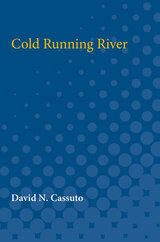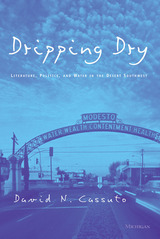2 books about Cassuto, David Nathan

Cold Running River
David N. Cassuto
University of Michigan Press, 1994
At a mere glance, Cold Running River has obvious regional and environmental appeal, but it goes far beyond those interests. Besides the fact that the Pere Marquette is a well-known, National Scenic River, and besides the fact that ecosystem management is a monumentally important and far-reaching topic, this book happens to read like a cold river runs: fast, refreshing, exuberant. It is special because David Cassuto has a beautiful way with the English language. Only he can make a chapter on lamprey eel infestation a gripping read. His style is so affecting, so warm, so "Norman Macleany"—you might be sitting on the river's bank, hearing the locals tell their tales of the river's history. That's what this book is: the river's history. It follows the miraculous course of the Pere Marquette: from its tumultuous glacial birth; to its devastation in the nineteenth century by unsustainable logging practices; to its recovery due to benign neglect. Cassuto approaches the river as both microcosm and metaphor; the controversies surrounding it speak to environmental and human dilemmas the world over.
[more]

Dripping Dry
Literature, Politics and Water in the Desert Southwest
David N. Cassuto
University of Michigan Press, 2001
More than any other single characteristic, aridity defines the American West. Water scarcity and its biologically critical function have also molded the regional literature of the region. Using novels by Barbara Kingsolver, Edward Abbey, John Steinbeck and Mary Austin, Dripping Dry combines literary analysis with environmental criticism to demonstrate how the myths that have pervaded the regional literature of the West have interacted with the myths that have shaped water policy throughout the twentieth century.
The four works selected (Animal Dreams, The Monkey Wrench Gang, The Grapes of Wrath, and The Ford) present a composite portrait of reclamation, which the author argues is one of the most important cultural and ecological phenomena in the nation's history. The tensions and contradictions presented by the novels underscore the compelling need for an ecocritique of the relationship between literature and politics. David N. Cassuto deciphers the myths of reclamation and restoration and presents a third alternative--sustainability--in their stead. The challenge is a large one, because of the size and complexity of the region and because nature continues to evolve and create itself, a process involving language, ideology, and the land.
The book is designed to be an interdisciplinary contribution both to the emerging field of literature and the environment, as well as to environmental studies. It will be welcomed by scholars as well as general readers interested in new approaches to literature and environmental issues, and by those interested in the geography and literature of the western United States.
David N. Cassuto, formerly of the English Department of the University of Missouri-Rolla, is a practicing attorney in San Francisco, specializing in environmental issues.
The four works selected (Animal Dreams, The Monkey Wrench Gang, The Grapes of Wrath, and The Ford) present a composite portrait of reclamation, which the author argues is one of the most important cultural and ecological phenomena in the nation's history. The tensions and contradictions presented by the novels underscore the compelling need for an ecocritique of the relationship between literature and politics. David N. Cassuto deciphers the myths of reclamation and restoration and presents a third alternative--sustainability--in their stead. The challenge is a large one, because of the size and complexity of the region and because nature continues to evolve and create itself, a process involving language, ideology, and the land.
The book is designed to be an interdisciplinary contribution both to the emerging field of literature and the environment, as well as to environmental studies. It will be welcomed by scholars as well as general readers interested in new approaches to literature and environmental issues, and by those interested in the geography and literature of the western United States.
David N. Cassuto, formerly of the English Department of the University of Missouri-Rolla, is a practicing attorney in San Francisco, specializing in environmental issues.
[more]
READERS
Browse our collection.
PUBLISHERS
See BiblioVault's publisher services.
STUDENT SERVICES
Files for college accessibility offices.
UChicago Accessibility Resources
home | accessibility | search | about | contact us
BiblioVault ® 2001 - 2024
The University of Chicago Press









